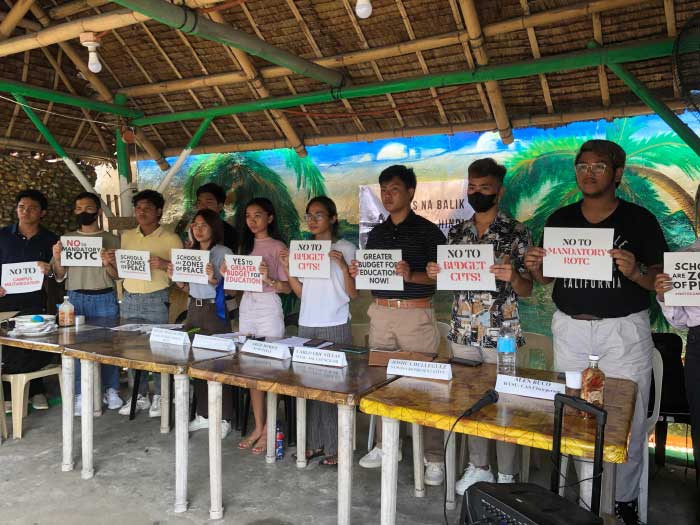
By Rjay Zuriaga Castor
Over 23 student organizations from West Visayas State University, the host school of the Visayas leg of the Reserve Officers Training Corps (ROTC) Games, strongly opposed the hosting of the event on the university’s premises on August 13 to 19, which they deem “poses a direct threat to our safety and democratic rights.”
“We firmly believe that the ROTC Games are being used to whitewash the painful history of Mandatory ROTC and its questionable practices. Instead of serving students’ best interests, this event is a reminder of the system’s attempts to condition our youth into a reserve force for future conflicts and oppression,” the student organizations said in a unity statement.
WVSU, Department of National Defense, Armed Forces of the Philippines (AFP), Commission on Higher Education, and Iloilo City Government signed a Memorandum of Agreement on August 7.
The organizations said the agreement between WVSU and the AFP is a “troubling alliance” despite the latter’s “history of challenging democratic rights and echoes a regrettable pattern from the Martial Law era.”
They believe that the hosting of the event contradicts the principles upheld by WVSU, which center around peace, inclusivity, and academic advancement.
WVSU’s College of Education building will be used as billeting quarters for athletes, leading to classes in the building to be conducted virtually on August 14 to 18. WVSU will have its opening of classes on August 14.
“This highlights a misplaced priority, as educational pursuits should always come before events that glorify a program with a history of abuse and violence,” the student organizations said.
It furthered that public funds allocated for the ROTC Games could be more effectively utilized to address the urgent requirements of the education system.
“At a juncture where public funds are directed towards destructive ends, we demand a shift towards essential social services, including education and healthcare,” the statement read.
Based on the proposed National Expenditure Program for 2024, a 5.75% budget cut looms over state universities and colleges.
“The total budget cut amounts to 5.88 billion pesos. For the students, this means deprivation of the chance at a better education. With more funds, universities could admit more students where they can avail the Universal Access to Tertiary Education Law, hence, free tuition,” the statement furthered.
Senator Francis N. Tolentino, honorary chairman of the ROTC Games and a brigadier general in the Army reserve, who led the launching of the Visayas leg’s said the ROTC games “is not just a celebration of sports but a celebration of patriotism.
He said that the event is a way to promote and develop camaraderie, teamwork, self-discipline, and sportsmanship.
Senate Bill No. 2034, the measure which seeks to make ROTC mandatory for students in higher education institutions and technical-vocational institutions has already reached the second reading in the Senate.
In its second Legislative-Executive Development Advisory Council (LEDAC) earlier this July, Malacañang and congressional leaders agreed to prioritize the bill that will make ROTC mandatory, before 2023 ends or when the 19th Congress adjourns session for the Christmas and New Year break.
In 2002, the ROTC was abolished following reports of corruption, bribery, and abuses, including the murder of 19-year-old University of Santo Tomas student Mark Welson Chua. He was found dead on March 18, 2001, and his killing was linked to his exposé on the corruption and abuse in the university’s ROTC program.
Chua’s death paved the way for legislation that made ROTC optional in higher education.






















